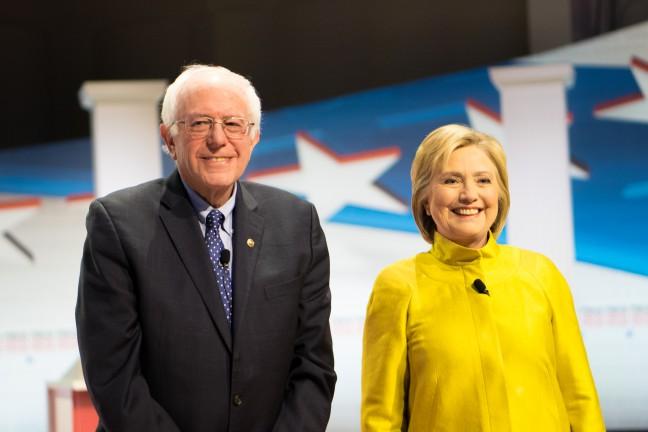According to the most recent Marquette Law School poll released Thursday, Donald Trump maintained his lead in Wisconsin, while the outcome for the two Democratic candidates has become more unclear.
U.S. Sen. Bernie Sanders, I-Vermont, pulled ahead of Hillary Clinton — but only by 1 percent. Forty-four percent of those polled supported Sanders, while 43 percent supported Clinton. In the January Marquette poll, Clinton led Sanders by 2 percent.
Despite the tight race, 60 percent of voters said they think Clinton will most likely win the nomination, while only 33 percent said Sanders is most likely to win.
For the Republican frontrunners, Trump still leads the race with 30 percent. U.S. Sen. Marco Rubio, R-Florida, followed Trump with 20 percent and U.S. Sen. Ted Cruz, R-Texas, received 19 percent. In January’s poll, Trump received 24 percent, Rubio 18 and Cruz 16 percent.
Forty-six percent of Republican primary voters said they think Trump is the most likely presidential nominee, regardless of who they support personally.
Eight percent supported both Ohio Gov. John Kasich and Ben Carson. Florida Gov. Jeb Bush, who dropped out of the race while the poll was being conducted, received 3 percent.
Ten percent of Republican primary voters polled said they did not know who they would vote for.
In head-to-head matchups for the November general election, Sanders leads both Rubio and Cruz with 53 points. Rubio and Cruz each received 35 points when pitted against Sanders. In a Sanders versus Trump general election, Sanders leads with 54 points, compared to Trump’s 34.
Overall, in presidential head to head match-ups, Sanders does better than Clinton against the leading GOP candidates. #mulawpoll
— MULawPoll (@MULawPoll) February 25, 2016
A Clinton/Rubio matchup is much closer. When paired with the Florida senator in a mock general election, Clinton received the support of 44 percent of those polled, while Rubio received 43 percent. In a Clinton versus Cruz scenario, both receive 43 percent, and when going head-to-head with Trump, Clinton leads 47 percent to Trump’s 37.
How uncomfortable would you be with this candidate as president? Overall “very uncomfortable” with Trump is 53%. #mulawpoll
— MULawPoll (@MULawPoll) February 25, 2016
The margin of error for Democratic primary voters was +/-6.9 percentage points and was +/-7.5 percentage points for Republican primary voters.
For the Wisconsin Supreme Court race, 37 percent of those polled said they would vote for Wisconsin Supreme Court Justice Rebecca Bradley, while 36 percent said they would vote for Wisconsin Court of Appeals Judge JoAnne Kloppenburg.
Most registered voters were unfamiliar with candidates for the Wisconsin Supreme Court — 60 percent said they didn’t have a favorable or unfavorable view of Bradley and 57 percent said the same of Kloppenburg.
There has been little change in the U.S. Senate race. Russ Feingold is still the current frontrunner, receiving 49 percent support, while U.S. Sen. Ron Johnson, R-Wisconsin, received 37 percent. In the January poll, Feingold was at 50 percent and Johnson was at 38 percent.
The poll also determined the popularity of presidential candidates by calculating a “net favorability” for each candidate. Trump had the worst favorability ratings with a score of -43 percent. Following him were Clinton and Cruz, with -18 percent each and Rubio with -8 percent.
Net favorability means subtracting negative ratings from positive ratings, and is indicator of overall popularity. #mulawpoll
— MULawPoll (@MULawPoll) February 25, 2016
Kasich and Sanders were the only candidates to receive positive favorability ratings overall, with Kasich at 6 percent favorable and Sanders at 11 percent favorable.
Respondents were also asked whether they think the U.S. Senate should hold hearings to fill the position of the late U.S. Supreme Court Justice Antonin Scalia, who died Feb. 13. Fifty-one percent said the U.S. Senate should hold hearings and vote on a nominee for this year, while 40 percent said the U.S. Senate should wait to fill his position until 2017.
Gov. Scott Walker’s job approval rating remained relatively unchanged from January’s poll, with 55 percent disapproving and 39 percent approving. In January, these numbers were 57 percent and 38 percent respectively.
The poll interviewed 802 registered Wisconsin voters from Feb. 18 to 21. Of those polled, 297 were Republicans and 343 were Democrats.


